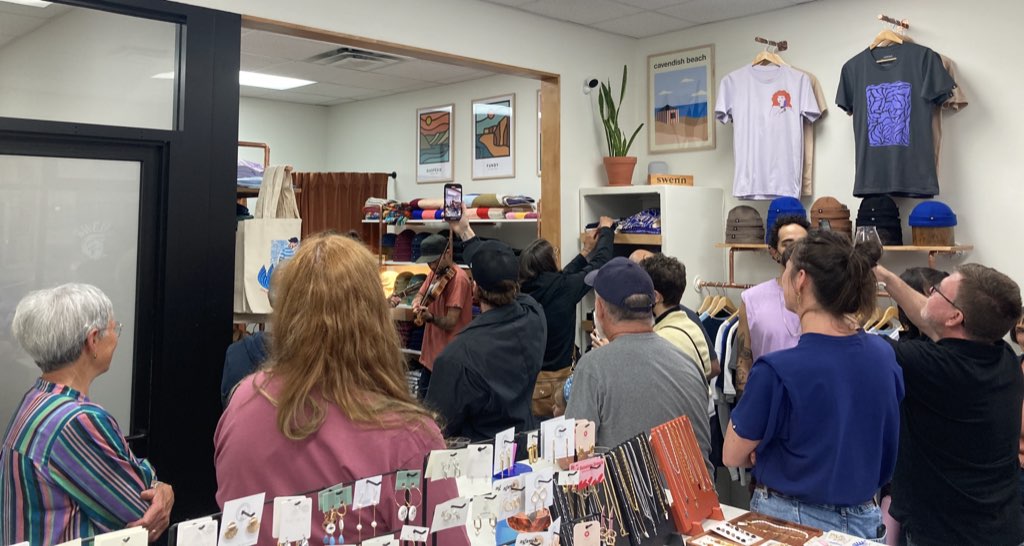Cowboys Cry Too, a ballad by Kelsea Ballerini, with Noah Kahan:
I grew up wishing I could close off the way my dad did
‘Cause that man never felt a damn thing he didn’t wanna feel
But I’ve burned too many miles tryna ride out all the sadness
But you can’t outdrive pain, someday it’s gonna take the wheel
Can’t be alone, but don’t wanna get close to anybody
Don’t wanna bare teeth, but don’t wanna look weak, it’s a tough spot
But I’m afraid you’ll walk away when the tears start runnin’
But I hope not
I’ve watched curiously over the past few years as my friend Hai, at The Shed, has developed, fine-tuned, and found markets for canned Kool Brew coffee.
This summer she’s celebrating distribution through Sobeys, but I snagged a can the other day from the Morell Coop. It’s high-test.

I accompanied Olivia to the Access PEI office in the Charlottetown Mall this afternoon to submit the paperwork of her official change of name.
The process went extremely smoothly: we were in and out in 15 minutes.
I want to highlight the professionalism of the clerk who processed Olivia’s paperwork. Many people, sensing Olivia communicates differently, defer to communicating with the person accompanying her, often ignoring Olivia completely; in this case, however, the clerk addressed everything directly to Olivia, as is right and proper. It was refreshing.
In a month or so Olivia should have a new birth certificate.
The process was not inexpensive: the change of name was $185 and the new birth certificate was $35. This despite the minister responsible, Hon. Bloyce Thompson, committing to examine the fees three years ago. As reported by the CBC at the time:
Thompson said he would take these concerns back to the department and see if any changes could be made.
“I have to acknowledge that that is an exorbitant amount of money and I wasn’t aware of that,” Thompson said.
We should be supporting and celebrating trans Islanders in change of name, not imposing financial penalties like this. I hope Minister Thompson follows through on his commitment.
———
Postscript
I heard from Minister Thompson’s office yesterday:
On November 18, 2023, amendments to the Change of Name Act and Regulations came into force which reduced the fee for a legal change of name, from $190.90 to $100.
In addition, the Vital Statistics Office also removed the fees for amending an electronic birth record following a legal name change.
Olivia was charged the old fee in error, and the excess will be refunded.
For our June edition of This Box is for Good we created a 24 page zine to tell the story of the project, and to nudge box receivers to register and pass along their boxes.
(The project is as much about this act of passing-along-generosity, and many people who are receiving don’t pass them on).
We’ve still a few copies of the June box available if you’d like to request we mail you one for free.
This afternoon I scanned the pages of the zine, so you can also read it online.
I took the lights in our back yard to a whole new level yesterday, stringing wire cable between trees to make everything more solid. (Last year we just strung the lights under their own weight).
The wires are from $19 kits from Home Hardware (they are in the hardware section near the bulk wire). Each kit has hardware and 50 feet of cable. The only extra things I needed were a couple of turnbuckles (one aisle over, if you’re looking), one for each run, and a pack of 100 zip ties to attach the lights to the cable (you can, in theory, run the cable through the holes in the lights, but everything I read online suggested zip tires are a better option).
It was a multi-step job that took a couple of hours and a lot of ladder-moving: string and tighten wires (first figuring out how the hardware works), zip tie the lights to the wires, screw in the lightbulbs.
I’m very happy with the result. We had a back yard party yesterday, and they were a delightful background to it all.
CBC reports that the Ontario Science Centre, where I spent my final year of high school, has suddenly closed:
The Ontario Science Centre is shutting down immediately due to the risk that the building’s roof could collapse, due to the use of a type of lightweight concrete that has prompted concern, the province announced Friday.
The abrupt closure, which the province says could last years, comes after the government’s controversial announcement in 2023 that the popular landmark and attraction would be moved to the Ontario Place site — a move it says will save costs.
I am not a conspiracy-minded person, but this seems like an awfully convenient conceit for closing the facility, given the Ontario government’s inane plan to downsize and move the Science Centre to the Toronto waterfront.
From Scottish designer Morag Seaton, Making Zero Waste, a real project:
As a collective, MZW is committed to eliminating waste in the design process by inspiring tailors, upcyclers, brands and designers to re-think their waste strategies and re-imagine waste as an opportunity, as they continue to design products for a better future. The intent was for participants to gain knowledge about the theories, context and construction of zero waste pattern cutting and design. Throughout the workshops, MZW also explored how zero waste design can draw inspiration from the rich tapestry of African fashion and textile traditions and histories, while complimenting today’s contemporary fashion.
From Robin Sloan’s Moonbound, a description of “Matter Circus,” a fictional project:
Adjacent to Matter Circus were the manufactories, insatiably hungry for material from the recycling center. There were foundries and kilns, woodshops and upholsterers. More than anything, there were clothiers, ravenous for every kind of textile. Long streets were curtained on both sides with their offerings. Some had the look of homespun hodgepodge; others were so subtly reconstructed they would have earned applause on the runways of the Anth.
The clothes Ariel had worn out of Sauvage were in tatters. From a clothier of basic work attire, he acquired two shirts and a single pair of pants in the wide-legged style currently popular in the city. He began to say he would debit his balance of matter, but the clothier, eyeing the weave of his ruined clothes from far-off Sauvage, suggested: “Consider a trade?”
Ariel traded everything but the jacket—never that—and strutted out of the shop having never felt so fashionable, or indeed aware that fashion was an option. By the following week, his new pants were hopelessly passé, but Ariel still liked them.
My late father never understood blogging. Or really any sort of public-facing non-scientific personal reflection. Even the words he wrote to himself in his journal were anodyne. Regardless, those words served for him, and now for me, as a logbook, and one that, on this Father’s Day, allows me to draw him a little closer. Here’s what he wrote over the years:
1996
Calls from all my sons and Nana in honour of Father’s Day.
1997
Call from John with Father’s Day wishes.
2000
Father’s Day call from Stephen.
2003
Call from Stephen to wish me a happy father’s day, good long chat.
Father’s Day call from Peter.
2004
Got to Mike’s at 1250, great birthday and Father’s Day cards from him and stopped to admire his balcony plants and new barbecue.
Call from John with birthday and Father’s Day wishes.
2006
Morning calls from Peter and Steve to wish me a happy Fathers’ day, Steve called back again and we had a nice long chat.
Father’s Day call from John and had a long conversation.
2008
After dinner, Peter called to wish me a happy Father’s Day and we had a long conversation about many things.
Steve called to wish me Happy Father’s Day and I had a nice long chat with him and then I called John and did the same.
2010
My 73rd birthday and Father’s Day too!
Call from Johnny, also a cute Happy Birthday phone message from A.
2011
John called to wish me Happy Father’s Day and I remembered to wish him the same just before I hung up.
Happy Father’s Day, Dad.
My friend Thelma picked up her trumpet again:
I’ve been practicing a half hour most days of the week and guess what I discovered? Practicing consistently improves your playing. Who knew?
I’ve discovered a similar thing: daily practice leads to improvement, whether it’s physiotherapy, working out, meditation, cooking, cycling, reading.
I wonder if there’s something about how we 58 year olds were raised that caused us to doubt this to be true.
Something tells me it’s about faith at the core: a belief that something we do now (when we’re no good at something) can lead to mastery at some point in the future.
I’ve got that faith now; I wish it had come earlier.
I have such a soft spot in my heart for Swenn, the clothing and stationery store in downtown Charlottetown. It’s the kind of store you want in your remote coastal city, along with good coffee, a good bookstore, a good library, and good bicycle shops, if you pine for a hedge against creeping provincialism (and sometimes wish you lived in Brighton or Berlin or Bologna).
I am a dedicated wearer of Swenn Eco-essentials T-shirts (an about-face for me, as Olivia will attest, after several decades of dressing like it was 1957): I wear them to work out, I wear them as my daily driver. They keep their shape, they’re comfortable, and they’re reasonably priced.
So, like I said, I’m a fan.
Tomorrow — Saturday, June 15, 2024 — Swenn is celebrating the launch of their new Charlottetown location (at 204 Queen Street), and the launch of a new collection, from 4:00 p.m. to 7:00 p.m. An East Pointer & friend will be there at 4 to kick things off, followed by a DJ set at 5; Robert Pendergast is doing the catering.
I dropped by the new location today — it’s beside the post office, across from City Hall — to pick up some t-shirts and see the new space. It’s smaller, compact even. But it’s well-designed, and well-merchandised, and, more important than anything, it has actual daylight streaming through actual windows (the old location was landlocked inside the Confederation Court Mall, and while it had acreage to spare, it lacked access to light and air).
Perhaps I’ll see you at the launch tomorrow?


 I am
I am